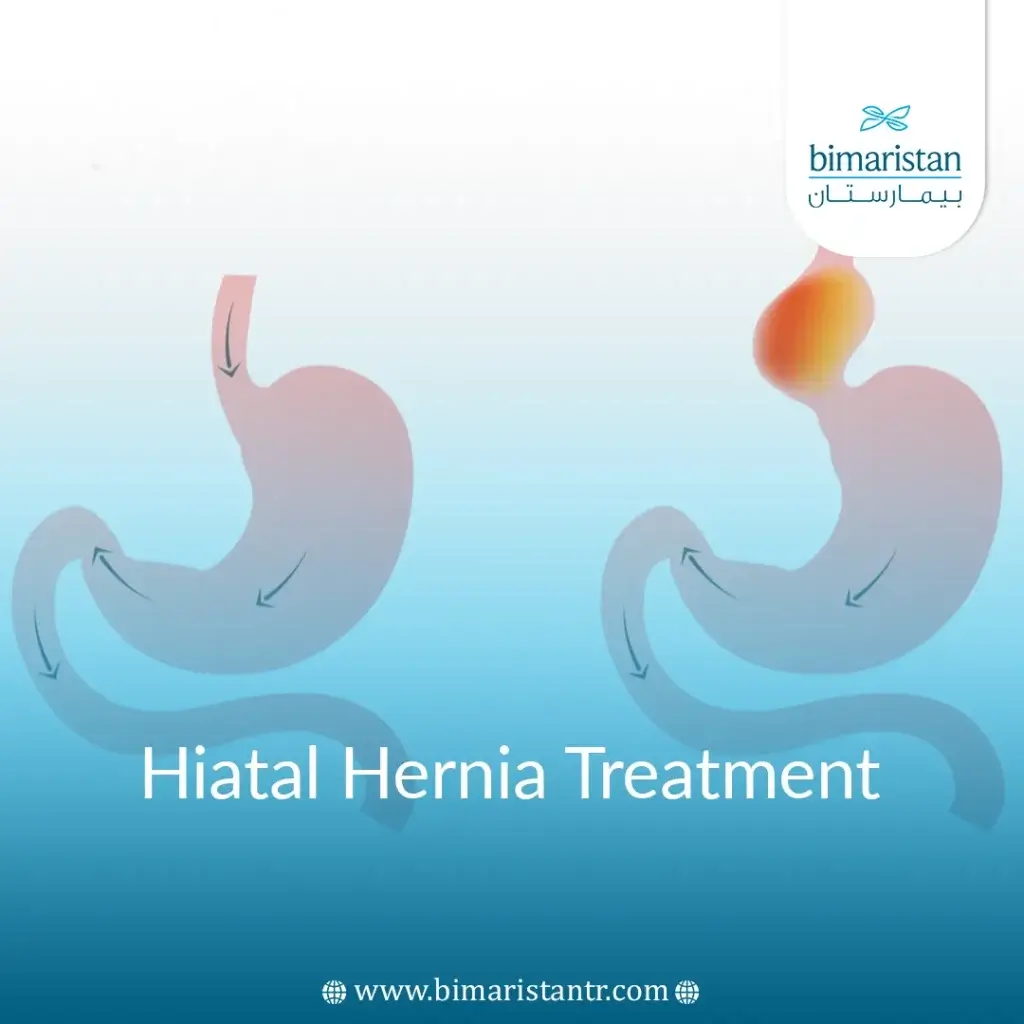Hiatal hernia is a common medical condition that affects the digestive system, as it occurs when part of the stomach pushes through an opening in the diaphragm into the chest area. This hernia can cause many uncomfortable symptoms, such as heartburn, difficulty swallowing, and chest pain. Although some cases may be simple and do not require treatment, more severe cases may require medical intervention. In this article, we will discuss the latest methods for hiatal hernia treatment, from lifestyle changes and drug treatments to advanced surgical procedures, to provide a comprehensive understanding of this disease and ways to deal with it effectively.
What is a hiatal hernia?
A hiatal hernia is a medical condition that occurs when part of the stomach pushes through an opening in the diaphragm into the chest area. The diaphragm is a muscle that separates the chest and abdomen and helps breathing. This muscle contains a small esophageal ostium opening through which the esophagus connects to the stomach. In the case of a hernia, this opening expands in size, allowing the stomach or part of it to push up into the chest
How to treat hiatal hernia
It occurs when the stomach rises through the natural opening of the diaphragm muscle for the passage of the esophagus; that is, the upper part of the stomach pushes out of its normal place in the abdomen into the chest cavity.
A hiatal hernia causes symptoms seen in GERD patients, such as heartburn, difficulty swallowing, and a constant feeling of bloating and fullness.
A hiatal hernia may be small and not accompanied by obvious symptoms. In such cases, there is no need to treat it, and it is often discovered by chance during a medical evaluation for another problem.
We treat this hernia only in symptomatic cases that affect the patient’s life. Many treatment methods are available, ranging from drug treatment to surgery to repair the hernia.
The appropriate treatment method depends on the severity of the symptoms, the size of the hernia, and the extent of the patient’s response to the treatments.
Hiatal hernia treatment options include:
Medication treatment
Medication treatment aims primarily to reduce the severity of symptoms and improve quality of life, but it does not work to treat the main problem of hiatal hernia.
The doctor prescribes antacid medications to relieve the patient of his symptoms. Pay attention to the risks of long-term use of antacids, which may be associated with many side effects.
Surgical treatment in Turkey
If treatment with medications fails to treat the symptoms or if the hiatal hernia is so extensive as to cause serious complications, then surgery is required.
The operation aims to return the stomach to its natural place within the abdomen. It also reduces the opening of the diaphragm and rebuilds the lower esophageal sphincter by bending the stomach floor around it. This raises the sphincter’s pressure and prevents food reflux in the opposite direction.
The process of folding the stomach fundus is known as Nissen fundoplication. The Nissen process can be performed laparoscopically, where the surgeon makes small incisions to insert an endoscope equipped with a camera and other surgical tools to help the surgeon complete the operation.
Laparoscopic surgery is distinguished from traditional surgery in that it is minimally invasive, with fewer complications and a short recovery period.
Surgery is the definitive hiatal hernia treatment in most cases, as it permanently eliminates symptoms. Contact us to learn more details about the operation.
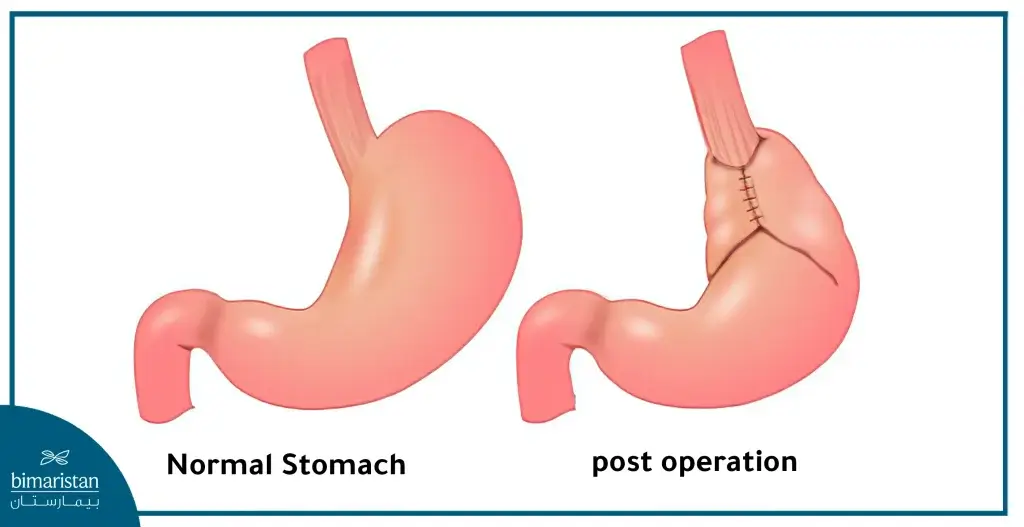
Treatment through lifestyle changes
Lifestyle modifications are important in treating a hiatal hernia and alleviating the affected person’s symptoms. These modifications include the following:
- Reducing the amount of food per meal (dividing the amount into several meals)
- Lose weight by practicing sports activities
- Avoid foods that increase heartburn (chocolate, fatty foods, caffeine, mint, garlic, onions)
- Quit Smoking
- Avoid lying down immediately after eating
- It is preferable to raise the head of the bed to 45 degrees while sleeping
What are the causes of hiatal hernia?
The most important reason for hiatal hernia is high pressure in the abdominal area. High pressure in the abdomen pushes the stomach out of its natural place and rises toward the chest.
This hernia may also occur for other, less common reasons, such as injury to the diaphragm area after a traumatic event or surgery.
A congenital deformity of the diaphragm muscle may cause a hernia. The child may have a deformed diaphragm with a large gap.
The most important reasons that increase abdominal pressure are:
- Chronic cough and vomiting
- Persistent constipation
- Lifting heavy weights
- Severe clenching during defecation
- Pregnancy or ascites
Types of hiatal hernia
There are two main types of hiatal hernia, which are as follows:
Sliding hernia
A sliding hernia occurs when the stomach and part of the lower esophagus that connects to the stomach push out of their normal place through the diaphragm.
This pattern is more common and is often asymptomatic or associated with symptoms of gastroesophageal reflux.
Rolling hernia
In a rolling hiatal hernia, both the esophagus and the stomach remain in their normal place. Still, part of the stomach is compressed through the opening of the diaphragm to be located next to the esophagus. Compression of this part of the stomach may lead to a lack of blood flow, called a strangulated hernia.
A strangulated hiatal hernia must be treated as soon as possible because it poses a risk that the strangled part of the stomach will die.
This type is less common than a sliding hernia, but it is more serious and more concerning.
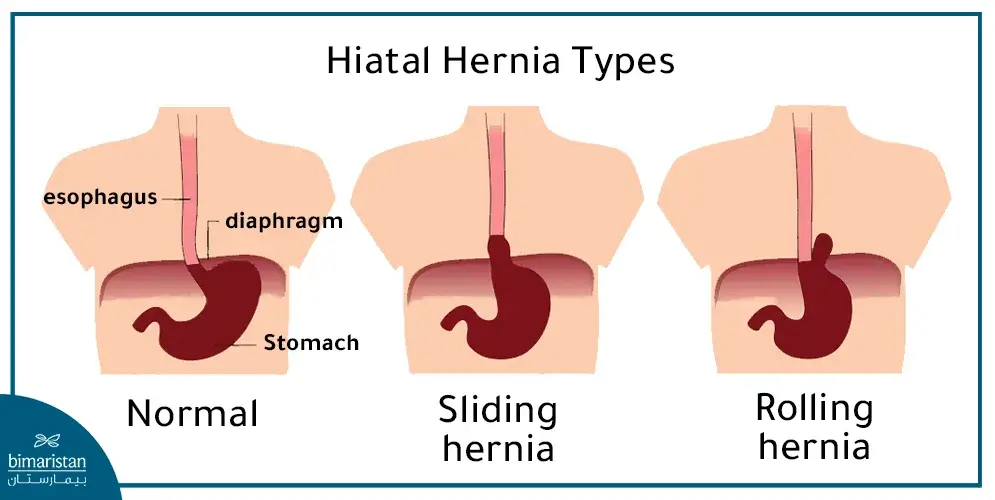
Hiatal hernia symptoms
Many patients with hiatal hernia do not experience symptoms. The appearance of symptoms depends on the severity and degree of the hernia.
We list the most common symptoms that patients may suffer from:
- Regurgitation or stomach acid reflux
- Food or liquids return to the mouth, causing a bad taste (halitosis)
- Dysphagia
- Frequent flatulence and burping
- Discomfort or pain in the chest or abdomen area
- shortness of breath
- Feeling full early when eating
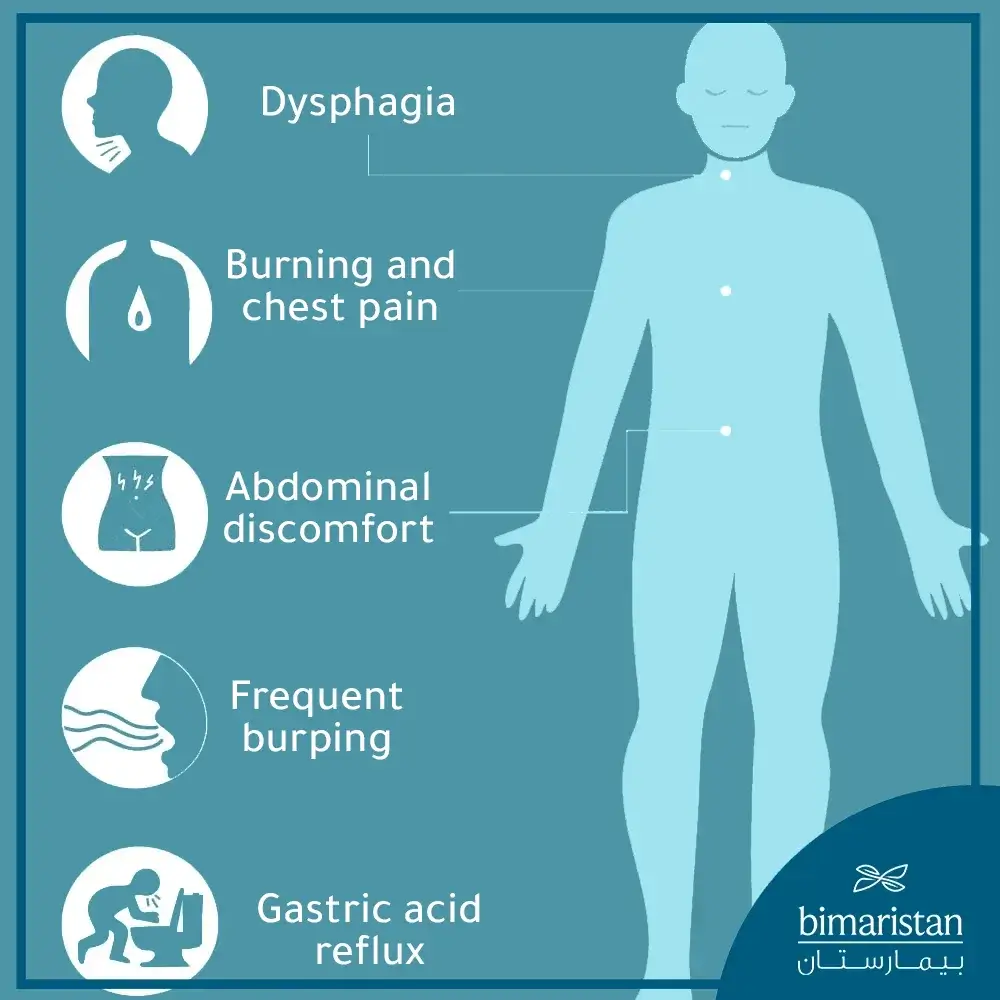
Hiatal hernia diagnosis
Several tests are available to detect the presence of a hiatal hernia, which is often diagnosed when the cause of chest pain is investigated.
The diagnosis of hiatal hernia is made by performing the following:
X-ray imaging with barium suppositories
The person is given a barium contrast solution, and then x-rays of the upper digestive system, specifically the esophagus, are taken. The x-rays show abnormal changes in a hiatal hernia.
Upper gastrointestinal endoscopy
It is a thin, flexible tube equipped with a camera that is inserted through the mouth to examine the esophagus and stomach from the inside and evaluate the presence of infections or abnormal changes in the upper digestive system.
Study of esophageal motility
This test helps measure the strength of esophageal contractions while eating, as well as the pressure of the lower esophageal sphincter and its ability to relax during eating.
Several pathological changes appear in the esophagus when a hernia occurs, such as high lower esophageal sphincter pressure.
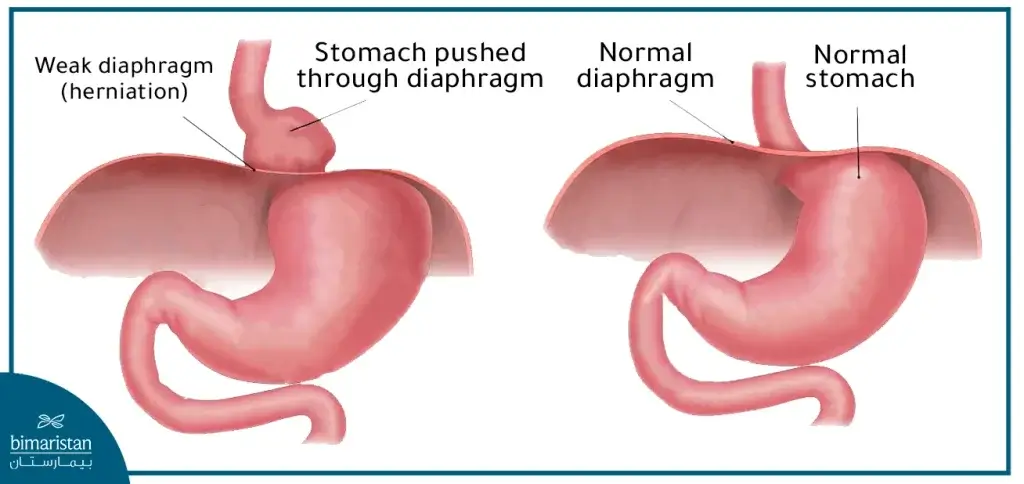
My experience with hiatal hernia treatment
A hiatal hernia patient narrates his experience with the disease and how he underwent a surgical procedure that enabled him to completely recover from the hiatal hernia and its symptoms. He says:
I have always suffered from annoying symptoms that get worse over time and get worse after eating, so I decided to pay a visit to the doctor to find out the cause of this discomfort and take the appropriate treatment.
During my visit to the doctor, after I explained the symptoms I was suffering from, the doctor asked me to do some investigations, such as an
The doctor offered me several treatment options, such as antacid medications, in addition to the possibility of performing a surgical procedure aimed at treating the hiatal hernia permanently.
I felt a little afraid about surgery, but the doctor advised me because the hiatal hernia I suffer from is relatively large, so I made the decision to undergo surgery. It was scheduled for several days later.
During the operation, I was placed under anesthesia, and then I woke up after the surgery was completed. The doctor told me that I should rest in bed for some time and avoid violent physical activities for some time. After some time after the operation, I felt better and relieved of the symptoms I was feeling, and I could say that I had completely recovered from my hiatal hernia.
Sources:
- WebMD
- Cleveland Clinic
- Healthline

